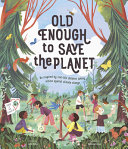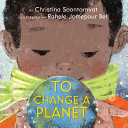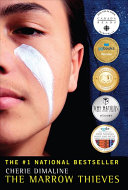Listed below are selected resources for teachers, picture books, fiction, and non-fiction related to climate justice.
Teacher Resources
 Teaching when the world is on fire: authentic classroom advice, from climate justice to Black Lives Matter
Teaching when the world is on fire: authentic classroom advice, from climate justice to Black Lives Matter
edited by Lisa Delpit
Is it okay to discuss politics in class? What are constructive ways to help young people process the daily news coverage of sexual assault? How can educators engage students around Black Lives Matter? Climate change? Confederate statue controversies? Immigration? Hate speech? In this book, Delpit turns to a host of crucial issues facing teachers in these tumultuous times.
 Teaching as activism: equity meets environmentalism
Teaching as activism: equity meets environmentalism
edited by Peggy Tripp and Linda Muzzin
Weaving together concerns about environmental and social justice, this book brings together constructive demands for change and theoretical debate. The goals are to question the legacies of colonialism, capitalism, and globalization and create a more inclusive interdisciplinary education.
 Critical education and sociomaterial practice: narration, place, and the social
Critical education and sociomaterial practice: narration, place, and the social
by Marcia McKenzie & Andrew Bieler
In turning to the sociomaterial contexts of learning, this book underscores how social and environmental issues are necessarily linked, such as in the production of food deserts in cities or in the pollution of the drinking water in Indigenous communities through oil development.
 Education and climate change: living and learning in interesting times
Education and climate change: living and learning in interesting times
edited by Fumiyo Kagawa and David Selby
There is widespread consensus in the international scientific community that climate change is happening and that abrupt and irreversible impacts are already in motion. In this volume, contributors review and reflect upon social learning from and within their field of educational expertise in response to the concerns over climate change.
 Who are you without colonialism?: pedagogies of liberation
Who are you without colonialism?: pedagogies of liberation
This is not a conventional book because the seed comes from the depth of the volcanic cauldron that awaits silently underneath the Lake Ilopango, the umbilical cord of our Humanity and yours. It is a scream, it is an offering, it is pain and it is love. It is a collective offering to those who are responding to a call of Liberation based on Indigenous Principles to protect and defend the land beyond theories, beyond rhetorical and metaphorical questions. This is a tiny-tiny glimpse into Lak’ech.
Picture Books
Niveau scolaire (Grade level): Preschool-1
Nibi is an Anishinaabe girl on the search for clean water to drink. Though she is faced with repeated obstacles, Nibi’s joyful and determined energy become a catalyst for change and action as her community, and in widening circles, the country and government rally around her to make clean drinking water available for all.
Niveau scolaire (Grade level): K-7
Inspired by the many Indigenous-led movements across North America, this book issues an urgent rallying cry to safeguard the Earth’s water from harm and corruption. Water is the first medicine. It affects and connects us all . . . When a black snake threatens to destroy the Earth / And poison her people’s water, one young water protector / Takes a stand to defend Earth’s most sacred resource.
Niveau scolaire (Grade level): 1-5
Meet 12 young activists from around the world who are speaking out and taking action against climate change. Learn about the work they do and the challenges they face, and discover how the future of our planet starts with each and every one of us.
Niveau scolaire (Grade level): 2-3
This book demonstrates the importance of caring for our planet, and how our individual and collective actions multiplied together can make the world better. The illustrations invite readers to spot and follow the same characters through their daily lives and ultimately to the famous climate march on Washington.
Fiction
Niveau scolaire (Grade level): 2-7
Minni lives in the poorest part of Mumbai, where access to water is limited to a few hours a day and the communal taps have long lines. Lately, though, even that access is threatened by severe water shortages and thieves who are stealing this precious commodity—an act that Minni accidentally witnesses one night. Meanwhile, in the high-rise building where she just started to work, she discovers that water streams out of every faucet and there’s even a rooftop swimming pool. What Minni also discovers there is one of the water mafia bosses. Now she must decide whether to expose him and risk her job and maybe her life. How did something as simple as access to water get so complicated?
Niveau scolaire (Grade level): 3-8
A twelve-year-old Indian immigrant in New York City and a Kentucky coal miner’s son become pen pals, and eventually best friends, through a series of revealing letters exploring such topics as environmental activism, immigration, and racism.
Niveau scolaire (Grade level): 9-12
Humanity has nearly destroyed its world through global warming, but now an even greater evil lurks. The Indigenous people of North America are being hunted and harvested for their bone marrow, which carries the key to recovering something the rest of the population has lost: the ability to dream. In this dark world, Frenchie and his companions struggle to survive as they make their way up north to the old lands. For now, survival means staying hidden – but what they don’t know is that one of them holds the secret to defeating the marrow thieves.
Niveau scolaire (Grade level): 10-12
Andrea, a young Indigenous Colombian woman, has returned to the land she calls home. Only nineteen years old, she comes to mourn her lost child, carrying a box in her arms. And she comes with another mission. Andrea has hidden a camera upon herself. If she can capture evidence of the illegal mining that displaced her family, it will mark the first step toward reclaiming their land.
Non-Fiction
 How to change everything: the young human’s guide to protecting the planet and each other
How to change everything: the young human’s guide to protecting the planet and each other
Niveau scolaire (Grade level): 4-12
Full of empowering stories of young leaders all over the world, this information-packed book from award-winning journalist and one of the foremost voices for climate justice, Naomi Klein, offers young readers a comprehensive look at the state of the climate today and how we got here, while also providing the tools they need to join this fight to protect and reshape the planet they will inherit.
 Saving earth: climate change and the fight for our future
Saving earth: climate change and the fight for our future
Niveau scolaire (Grade level): 4-6
A timely and important illustrated nonfiction guide for middle grade readers about the history of our fight against climate change, and how young people today can rise to action.
 Chasing bats and tracking rats: urban ecology, community science, and how we share our cities
Chasing bats and tracking rats: urban ecology, community science, and how we share our cities
Niveau scolaire (Grade level): 4-7
Featuring the work of a diverse group of eleven scientists–herself included!–Dr. Cylita Guy shows how studying urban wildlife can help us make cities around the world healthier for all of their inhabitants. In the process, Guy reveals how social injustices like racism can affect not only how scientists study city wildlife, but also where urban critters are likelier to thrive.
 All the feelings under the sun: how to deal with climate change
All the feelings under the sun: how to deal with climate change
Niveau scolaire (Grade level): 7-9
With this book, kids will get an expert understanding of the science behind climate crisis, plus engage with lots of do-able self-guided activities, journaling prompts, and useful resources. Readers will also hear about other kids around the world who have made a difference that just may inspire them to practice eco-justice and combat global climate injustice themselves, by putting their own eco-values into action.
 One Earth: people of color protecting our planet
One Earth: people of color protecting our planet
Niveau scolaire (Grade level): 7-12
This nonfiction book for middle readers profiles twenty environmental activists of colour from around the world. Their individual stories show that the intersection of environment and ethnicity is an asset, not an obstacle, to helping the planet. Illustrated with photos of each of the people profiled.
 Groundswell: Indigenous knowledge and a call to action for climate change
Groundswell: Indigenous knowledge and a call to action for climate change
Niveau scolaire (Grade level): 11-12
This book offers a collection of stirring and passionate essays from both Indigenous and non-Indigenous writers that eloquently present a compelling message about how traditional Indigenous knowledge and practices can and must be used to address climate change. The chapters interconnect, taking us from radical thinking to the gentleness of breath, and demonstrate that we are all in this together—everyone must understand what needs to be accomplished and participate in the care of Mother Earth.
Trouver d’autres ressources
Voici quelques conseils pour trouver d’autres ressources dans ce domaine :
- Sur la page principale du site de la bibliothèque de l’UBC, utilisez la boîte de recherche générale pour rechercher des matériaux à travers toutes les succursales de la bibliothèque de l’UBC.
- Pour limiter vos résultats aux matériels disponibles à la Bibliothèque de l’éducation, visitez le site web de la Bibliothèque de l’éducation et effectuez une recherche à l’aide de la case “Search Education Resources” située dans la bande à gauche de l’écran.
- Remarque : les ressources étant principalement cataloguées en anglais, les termes ci-dessous donnent généralement plus de résultats que les recherches effectuées en français. Vous pouvez filtrer votre liste de résultats par langue dans la barre latérale de gauche.
- Utilisez des termes de recherche spécifiques, tels que
- “climate justice”, “environmental justice”, “climate change”, “environmentalism”, or “climate AND juvenile literature”
- Pour trouver des plans de cours, incluez “lesson plans”, “lesson planning”, or “activity programs” dans vos termes de recherche.
Finding More Resources
To find more resources in this area, try the following:
- Search using the General tab on the UBC Library website to look for material in all UBC Library branches.
- Search using “Search Education Resources” box in the left hand bar on the Education Library website to limit your results to physical materials in the Education Library.
- Use specific search terms, such as
- “climate justice”, “environmental justice”, “climate change”, “environmentalism”, or “climate AND juvenile literature”
- To find lesson plans, include “lesson plans”, “lesson planning”, or “activity programs” in your search terms.







